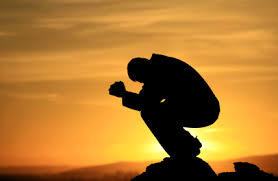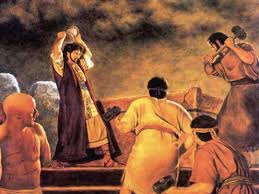For, brothers, I don’t want you to miss the significance of what happened to our fathers. All of them were guided by the pillar of cloud, and they all passed through the sea, 2 and in connection with the cloud and with the sea they all immersed themselves into Moshe, 3 also they all ate the same food from the Spirit, 4 and they all drank the same drink from the Spirit- for they drank from a Spirit-sent Rock which followed them, and that Rock was the Messiah. 5 Yet with the majority of them God was not pleased, so their bodies were strewn across the desert. 6 Now these things took place as prefigurative historical events, warning us not to set our hearts on evil things as they did. (1Co 10:1-6 CJB)
Weeping that Captures the Father’s Attention
The History Books of the Bible document the reign of several Kings of Israel and Judah. Most of the kings of the combined and separated nations were evil in the sight of Yehovah. For instance: Manasseh, came to the throne at 12-years of age, and reigned over Judah from Jerusalem. His story is capture in 2 Chr. 33:1; 2 Kin. 20:21. Manasseh’s reign was saw evil in the land of Judah–2Kin. 16:3. The primary evil was the worship of Molech. Molech worship was left over from the former inhabitants of the land (2 Kin. 16:3). When Manasseh came of age he oversaw the rebuilding of the high places that once destroyed by his father, Hezekiah. Manasseh also oversaw the erecting of alters for Ba’al and the production of groves (or asherah), as Ahab had become famous for. Lastly, the worhsip of the heavenly hosts became a mainstay religion of the nation.
How could this have happened to the nation of Judah. Knowing that their sister nation Israel had suffered irreparable harm as a result of similar worship of pagan gods and observing pagan rites. Judah effectively left Torah observance for worship of molten images and the erecting of groves or asherah. They left the fear of Yehovah for the service of Ba’al and the worship of the host of heaven. Both had erected alters in the Temple of Yehovah to other gods (Jeremiah) and to the host of heaven. This practice provokes Yehovah to anger (Deu. 4:19). The host of heaven included the worship of the sun, moon, and stars and this all took place on the Temple grounds (2 Chr. 33:5; Eze. 8:16).
The Tanakh is clear that Yehovah brings evil upon those who know better but choose to worship Ba’al, the host of heaven, and asherahs. In the sake of Israel and ultimately Judah, Yehovah aimed to forsake His inheritance (His chosen) and deliver them into enemy hands.
Sadly, Manasseh’s son Amon followed in his footsteps. Amon was murdered by his own servants. But praise be to Yehovah, He can and has provided for the raising of a righteous seed and thus Amon’s son, Josiah, succeeded him to the throne at the tender age of 8 (2 Kin. 23). Josiah took the nation of Judah on a 180 degree turn from their decades of practicing evil and brought them back towards the light of Yehovah’s Torah. This inspiring and touching story is documented in 2 Kin. 23.
Essentially, after Amon’s death, Josiah ascended to the throne of Judah at the age of 8. Despite the evil that his father oversaw during his reign, Josiah came to to know Yehovah and follow His ways. At 26-years of age, King Josiah realized that the Temple was in noticeable disrepair. Thus he directed the Temple administrators to assess the Temple and determine what needed to be done to get it in proper order, deserving of the House of the Lord. The administrators were instructed to take the funds from the treasury and hire the professionals to make the needed repairs, this after years of disrepair and neglect of the House of the Lord under the reigns of Mannesseh, Amon and the other evil kings of Judah. While assessing the Temple, a priest by the name of Hilkiah placed into the hands of a scribe by the name of Shaphan the Temple’s Torah. Shaphan the scribe read the Torah to King Josiah (reference 2 Kings 22:9-10). Josiah’s response to hearing the Word of Jehovah? He learned and understood the problems through the content of Torah that was read to him that he and his nation were headed for certain disaster and destruction. Certainly, the books of Leviticus and Deuteronomy outline for the peoples of Yehovah the blessings and curses to be had in the event Yehovah’s chosen are obedient to Yehovah’s Laws or they are disobedient to His Laws, respectively. Clearly, after hearing these passages denoting blessings and curses, Josiah must have been horribly alarmed. This likely came atop Josiah coming to understand what Yehovah expected of His chosen people. The years of idolatry and the nation’s persistant wallowing in the filth of the very uncleanness that Yehovah strictly forbade His people to avoid, must have been a glaring realization for the young ruler.
Have you ever had the ocassion whereby you learned that you or someone you loved had been doing something or some things grossly wrong for a long period of time? Recall how it made you feel. Recall how you likely tried to rationalize the wrong doing in hopes that you could dispell the truth of the matter. Recall how it sickened you to your stomach and the desparation that followed as you searched for ways to make proper amends to the one(s) who may have been offended. Not to mention the fear that took center stage in your mind of the pending repercussions for the times of wrongdoing. If, however, we are of pure hearts, we are ultimately thankful for the revealed knowledge that we were doing wrong. It is this revealed knowledge that provides us the opportunities to make amends and get on a proper track of living.
Terrified of the impending doom that was likely overshadowing Judah as a result of her decades of idolatry and adultery (both involving the turning away from the one true God), Josiah sent immisaries to a prophetess, by the name of Huldah, to “inquire of Jehovah for me, and for the people, and for all Judah, concerning the words of this book that is found; for great is the wrath of Jehovah that is kindled against us, because our fathers have not hearkened unto the words of this book, to do according unto all that which is written concerning us. (2Ki 22:13 ASV)” What Josiah’s immissaries learned from Huldah likely confirmed Josiah’s worse fears: “Thus saith Jehovah, Behold, I will bring evil upon this place, and upon the inhabitants thereof, even all the words of the book which the king of Judah hath read. Because they have forsaken me, and have burned incense unto other gods, that they might provoke me to anger with all the work of their hands, therefore my wrath shall be kindled against this place, and it shall not be quenched. (2Ki 22:16,17 ASV)
Indeed, indicting and severe information to receive from the spokesperson of the Almighty. What makes matters worse here, is the addendum from the Eternal that was attached to the edict and that was that Yehovah’s wrath would not be quenched. In other words, there are often consequences associated with disobedience to Torah and no amount of obeience will change that. Sometimes, we find ourselves in situations of disobedience to Torah, yet when we come to terms that we need to repent and change our ways, we are ill-prepared to accept the consequences that must come with the offense.
It became apparent to me as I studied this amazing story, that often, during our periods of disobedience to Torah, our actions of evil against Yehovah and His Law, often sets in to motion a chain of events that we may not be altered despite our genuine desire to make the proper amends with the Father and to turn back to His Law. In these situations, we must be prepared to accept and endure the resulting punishment. The resulting punishment often has nothing to do with the repentance. Shaul (aka: Paul) taught: 23 For the wages of sin is death; but the gift of God is eternal life through Jesus Christ our Lord. (Rom 6:23-1 KJV)
Of course, this was not the end of the story. Our Father is merciful: “but thou art a God ready to pardon, gracious and merciful, slow to anger, and of great kindness, and forsookest them not. (Neh 9:17 KJV)” The love the Father had and continues to have for His chosen ones often leaves in place an enduring ledge of mercy that may not entirely stave off punishment for disobedience to the Father’s Torah, but may provide some form of respite or stay of execution for the pure of heart. In Josiah’s case, he exemplified the weeping that gets the Father’s attention.
The prophetess of the Most High explains: But unto the king of Judah, who sent you to inquire of Jehovah, thus shall ye say to him, Thus saith Jehovah, the God of Israel: As touching the words which thou hast heard, because thy heart was tender, and thou didst humble thyself before Jehovah, when thou heardest what I spake against this place, and against the inhabitants thereof, that they should become a desolation and a curse, and hast rent thy clothes, and wept before me; I also have heard thee, saith Jehovah. Therefore, behold, I will gather thee to thy fathers, and thou shalt be gathered to thy grave in peace, neither shall thine eyes see all the evil which I will bring upon this place. And they brought the king word again. (2 Kings 22: 18-20 ASV) After receiving the prophecy and the Words of the Almighty from the prophetess, Josiah did not rest upon his brand new insurance policy. He took action, despite the fact that His weeping caused the Father to impose a stay of execution upon the nation. Josiah obviously knew that if he were to save his nation from certain devastation, he had to reimpose the practice of Torah in the land; destroy the idols that had proliferated the land of Judah for decades (2 Kings 23:4, 8); walk after Yehovah (2Ch 15:12 And they entered into a covenant to seek the LORD God of their fathers with all their heart and with all their soul;); and to keep the Eternal’s commandments, His statutes (2 Kings 23:3). And if all this wasn’t enought, Josiah had the priests of Ba’al, Molech, and the heavenly hosts (i.e., the moon, the sun, and the planets) executed to ensure that the worship of the false gods and the worship of Yehovah’s creation would be eliminated. Indeed, Josiah’s heartfelt repentance on behalf of the nation proved to be quite revolutionary and left no doubt in the citizens of Judah’s mind that Judah would henceforth become a Torah adhering, Yehovah fearing, and idolatary hating nation. And what better time than the time of the Passover for this all to have happened? Passover marks the beginning of God’s calendar and the first of Yehovah’s appointed Feasts. A new beginning for Judah. A chance for rededication and purification for a once evil and pagan nation.
What weeping captures the Father’s attention? Weeping that is wholly associated with deep repentance and most importantly, decisive action to correct the wrongs that have been committed against the Almighty and our neighbor. Compared to the Children of Israel’s weeping in the Sinai, one can only conjure up a description of shame on the part of the Sinai-wanderers. The chosen ones wept because of a lack foods they had in Egypt and a misplaced sense of loss of material goods and comforts. They wept out of selfishness and bitter contempt towards Yehovah for placing them in the refiners fire known to us as the Sinai wilderness. Instead of weeping because they were failing Yehovah’s tests and refinements to become God’s special possessions at every turn–which would have been the proper weeping to be done in this particular situation and as was demonstrated by Josiah–they wept as a 2-year old who has been told “no” when they demand something that shouldn’t have.
Sadly, this is the state of our Faith today dear friends. Our focus is upon self and upon an eternity in heaven. The focus is NOT upon our relationship with the God of Abraham, Issac and Jacob; the creator of heaven and earth; the Great I AM. This misplaced focus is idolatrous and it sickens the Father. Yet the Father’s patience is unfathomable. We deserve the fate that was due Judah but was stayed by Yehovah because of Josiah’s repentance on behalf of his nation. Ultimately, Yehovah did punish the nation of Judah. I fear that our western nations are heading for a similar if not worse fate. We must not rest upon a false assumption that we will be raptured away from this world prior to the great tribulation. There is nothing in the Holy Writ that states such a thing. Although we may not be the direct cause for the impending punishment that is coming to our respective nations, we, like many of the patriarchs of Judah and Israel who saw their nations destroyed by Babylon and Assyria respectively, will endure and witness the destruction of our nations by the satanic led forces of this world (reference: 12 For we wrestle not against flesh and blood, but against principalities, against powers, against the rulers of the darkness of this world, against spiritual wickedness in high places. (Eph 6:12 KJV)). It will be required of us to endure to the end (reference: 13 But he that shall endure unto the end, the same shall be saved. (Mat 24:13 KJV)).
The Messianic Torah Observer lesson I see here is that we are in positions to be Yehovah’s special possession–the position that the Sinai Wanderers of the Exodus story once contended for but failed and lost because of their stiff neck nature and short-sightedness. Thus, there are tremendous benefits to be had as one of the Eternal’s special possessions. Once we have accepted this aspicious opportunity to be the Eternal’s chosen, we are no longer our own. Every aspect of our being should be and in most cases, must be, ordered by Yehovah. When we fail to acknowledge this or we stumble before the Almighty and the Spirit convicts us of our wrong-doings, then is the time for weeping with deep and honest repentence to emerge from our inner being that cries out to the one true God in such a way that it appeals to His heart and we are reconciled to Him and thus we may be spared serious punishment. When will we learn that complaining to Yehovah about our tirals and tribulations is not the answer to life. 18 In every thing give thanks: for this is the will of God in Christ Jesus concerning you. (1Th 5:18 KJV)20 Giving thanks always for all things unto God and the Father in the name of our Lord Jesus Christ; (Eph 5:20 KJV). Is this an easy thing to do? Heck no! In fact, for me, it has to be the most backward and awkward thing to do. I am a complainer by nature. Thus, I’ve learned to make complaining my outlet for venting my frustrations and hardships. However, this Torah lesson has provided me the wherewithal to correct this behavior and further cement my relationship with the Father. When I fail to do that which the Almighty would have me do or I violate His laws and commandments, I realize now what I must do and not, as the vast majority of self-professing Christians contend, simply utter “forgive me Lord for my sins” and leave it at that. Consider: if you wrong a spouse, would simply saying to him or her, he forgive me for messing up do the trick? In some cases, it might. In most cases, you might need a lot more words and most important, some actions to support your words, to reconcile you back to him or her. If words are not accompanied by actions, what security is there to be found by your spouse that you won’t repeat the same mistakes all over again? Why do we treat Adonai differently? Why do we treat Yehovah differently? Why do we treat Him as some nebulus concept that is immune to hurt feelings and thoughts of being abandoned? He is real and He is like us in some many ways? He loves to be loved and He loves to be first in our lives. It isn’t until we come to that place in our relationship with the Almighty where we acknowledge Him as real and we treat Him as real, then we move our relationship with Yehovah to the next level!



